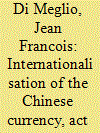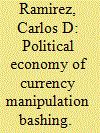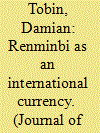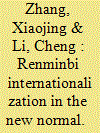|
|
|
Sort Order |
|
|
|
Items / Page
|
|
|
|
|
|
|
| Srl | Item |
| 1 |
ID:
054143


|
|
|
| 2 |
ID:
113975


|
|
|
|
|
| Publication |
2012.
|
| Summary/Abstract |
After two waves of important changes in the Chinese system of foreign exchange, one in July 2005, when the Chinese currency was allowed to fluctuate more widely against the US dollar, the other in June 2010, when it was then quoted against an undisclosed basket of currencies, but moreover, was allowed to be partially traded in Hong Kong with the invention of a 'twin', the 'offshore yuan' (CNH), a deep reform could have taken place. The creation of the CNH, allowing debt to be issued internationally in yuan, initially led to the belief that a real set of deep reforms was under way. Yet, like some reforms of the past, which were hesitant or even annulled, the path towards monetary and financial reform is encountering difficulty. The steps taken towards the 'regionalisation' or possibly the 'internationalisation' of the Chinese currency may well be taking the same route. Before the reforms have had time to come to fruition and deliver deep changes, there seems to be some indecisiveness, a sense of relative failure, or at least discovery of the limitations in a process which many, at least at the beginning, believed would be quick and decisive. This article attempts to demonstrate that, like some other Chinese reform processes of the past, the path is not yet very clear and claims of deep changes and unwavering success would be largely premature.
|
|
|
|
|
|
|
|
|
|
|
|
|
|
|
|
| 3 |
ID:
146199


|
|
|
|
|
| Summary/Abstract |
This study identifies 37 central banks that added China’s renminbi (RMB) to their reserve portfolio since 2010. Why do some states diversify into new reserve currencies at an early stage while most continue to take a wait-and-see approach? We argue that state preferences regarding international order influence decisions to invest in RMB. While some states support the liberal, US-led status quo, others prefer an emerging Chinese alternative order. We contend that as state preferences for international order move away from the US model (and toward China), the likelihood of diversifying reserves into RMB should increase. Thus, the decision to invest in RMB is not simply an economic choice. It is also a political act that signals and symbolizes a state’s preferences for a diminution of American global influence and support for a revised order. Employing new United Nations General Assembly (UNGA) ideal points data, we find that states with larger (smaller) ideal point distance with the United States (China) are more likely to adopt RMB as a reserve currency. Furthermore, political consideration—rather than economic concerns about transaction needs, optimal portfolio considerations, or instrumental calculations—best explains emergent demand for the RMB as a reserve currency.
|
|
|
|
|
|
|
|
|
|
|
|
|
|
|
|
| 4 |
ID:
152268


|
|
|
|
|
| Summary/Abstract |
This paper examines the policy challenges and dilemmas faced by China’s authorities in balancing exchange rate stability with the policy necessity of monetary autonomy. China will have to move toward greater exchange rate flexibility, particularly as the capital account becomes increasingly liberalized and the government pushes forward with RMB internationalization.
|
|
|
|
|
|
|
|
|
|
|
|
|
|
|
|
| 5 |
ID:
124558


|
|
|
|
|
| Publication |
2013.
|
| Summary/Abstract |
In recent years, one of the most frequently debated issues in Congress has been the value of the Chinese renminbi (RMB) relative to the U.S. dollar. Many members of Congress often accuse China of being a "currency manipulator." This paper has two objectives. First, it investigates the extent to which PAC contributions from key interest groups as well as constituent interests influence the frequency with which members of Congress criticize China's exchange rate policy, controlling for other factors. The results indicate that the odds that a congressman will call China a "currency manipulator" are 1.35 times higher for every $5000 in PAC contributions from groups that favor legislation against China. In addition, the results show that a one percentage point increase in the share of the congressional district labor force in manufacturing is associated with a 19.6% increase in the likelihood that the district's legislator will label China a "currency manipulator." Second, this paper investigates the consequences that "currency manipulation" bashing may have on the rate at which the RMB appreciates against the U.S. dollar. The results for a VAR model indicate that an increase in the incidence of "currency manipulation" bashing appears to temporarily slow down, rather than accelerate, the rate at which the renminbi appreciates against the dollar. This result suggests that bashing China may actually be counterproductive.
|
|
|
|
|
|
|
|
|
|
|
|
|
|
|
|
| 6 |
ID:
120837


|
|
|
| 7 |
ID:
120838


|
|
|
|
|
| Publication |
2013.
|
| Summary/Abstract |
Although it is commonly assumed that there are no precedents against which to benchmark Renminbi (RMB), this study argues that the People's Republic of China (PRC) own development experience provides a useful perspective on the internationalisation debate. This study indicates that lessons can be learnt from both the successes and the shortcomings of efforts to internationalise the RMB in the 1970s. During this period, state-owned banks in Hong Kong played a central role in mobilising finance for foreign trade. Access to Hong Kong's financial institutions allowed the PRC to maximise international trade receipts while minimising the risk of undue swings in capital flows. This study shows that although China no longer faces foreign exchange scarcity, economic reforms have not yet resolved vulnerabilities in China's financial institutions. As a consequence, Hong Kong has retained its role in mitigating the risks of internationalisation and as a globalising force for China's banking sector more generally.
|
|
|
|
|
|
|
|
|
|
|
|
|
|
|
|
| 8 |
ID:
152516


|
|
|
|
|
| Summary/Abstract |
In the present paper we explore the internationalization of the renminbi with reference to the experiences of other monetary powers, and discuss its determinants, prospects and implications for China's development in the “new normal.” Specifically, after summarizing the major progress made thus far, we conduct a regression analysis, showing that economic size and financial conditions are significant determinants of the international currency status, while inertia and other unobserved factors also play important roles. These empirical findings enable us to undertake a scenario analysis focusing on the renminbi's potential to become a global reserve currency. Based on this quantitative research, we then revisit China's policy initiatives designed to promote its currency overseas. In our view, the internationalization of the renminbi, along with financial deepening and liberalization, should be regarded as a means to achieve China's goal of reaching a more sustainable and balanced model of development.
|
|
|
|
|
|
|
|
|
|
|
|
|
|
|
|
| 9 |
ID:
122944


|
|
|
|
|
| Publication |
2013.
|
| Summary/Abstract |
When measuring the nominal effective exchange rate (NEER), three factors should be considered: direct import competition, direct export competition and third market competition. The traditional NEER methodology using aggregated export trade data underestimates the competition between countries producing homogeneous goods, so that the weight of the effective exchange rates is too reliant on trade scale. Based on 2002 6-digit items of the Harmonized Commodity Description and Coding System, this paper employs the competitive stress index to adjust the weighting system of the renminbi NEER for third market competition. In the new weighting system, European countries and some emerging economies have higher weights compared with some of the developed countries, including the USA, Japan and resources-dominated economies. This research will facilitate the understanding of changes in China's export competitiveness.
|
|
|
|
|
|
|
|
|
|
|
|
|
|
|
|
| 10 |
ID:
096224


|
|
|
|
|
| Publication |
2010.
|
| Summary/Abstract |
This paper is a tentative endeavor to delineate the potential of the renminbi to become a global currency. It first analyzes the critical economic, financial and policy attributes that are required to support a currency to gain an international role. It then examines whether China has the potential to acquire these attributes. The paper concludes by offering some provisional observations on the implications for Asia and the global economy, should the renminbi evolve into a world currency in the coming decades.
|
|
|
|
|
|
|
|
|
|
|
|
|
|
|
|
| 11 |
ID:
086593


|
|
|
|
|
| Publication |
2009.
|
| Summary/Abstract |
China has emerged as a major power in the world economy, so it seems natural to consider whether its currency will also have a major role. At present the renminbi is not used internationally. We look at the factors that contribute to the international use of currencies, and focus on the aspects of China's financial system that would have to change before the renminbi emerged as an important regional or world currency. Even with significant reforms, two questions would remain: whether the authorities would want to encourage its international use, and whether an economy with substantial party control could gain international acceptance for its currency.
|
|
|
|
|
|
|
|
|
|
|
|
|
|
|
|
|
|
|
|
|